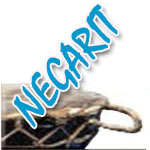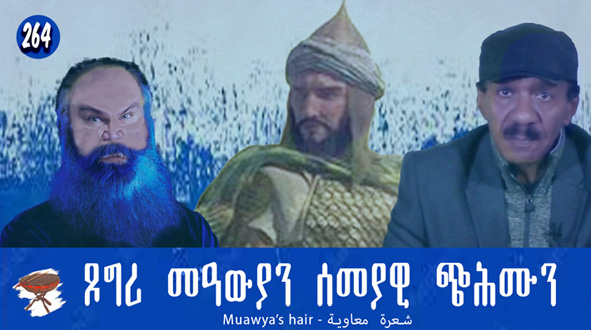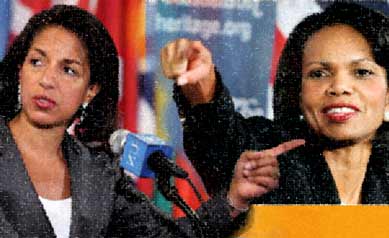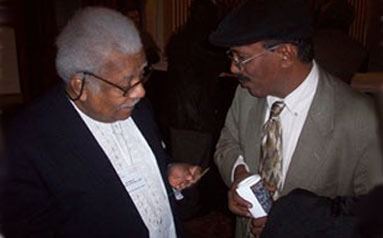Qernelios: Arte Mailam’s Political Recklessness

When the Pharaohs built the Sphinx of Giza it must have been finished with high quality plaster and colourful paintings, but with time, wind, heat and rain eroded the structure and left it with a dull facade. The Obelisks of Aksum and the stellaes of Metera faced the same fate; and though the elements are to blame, it is mainly the lack of maintenance that reduced the marvellous edifices to rubble.
The largest Eritrean Sphinx is Hamid Idris Awate and no Eritrean patriot should allow that edifice to be vandalized by anyone; the name of Awate must not suffer from lack of protection and maintenance. And after reading the tens of condemnations against the transgression on Awate’s history that I read over the last few days, I am content; swift responses are necessary in such a situation.
Symbols Are Us
In 1990 when Saddam Hussein invaded Kuwait, his regime immediately changed the street names and erased anything considered a Kuwaiti symbol to demoralize the people and force them to forget their identity. Haile Sellassie had launched his project in a similar way to erase the Eritrean identity beginning by lowering the national Eritrean flag.
If a pillar that supports a bridge is destroyed, the bridge crumples; anyone whose goal is to destroy a nation begins by demolishing its symbols and watches it crumple. Symbols are important to a nation, they cement unity and re-enforce the national identity of citizens
Over the years, provocateurs have repeatedly targeted Eritrean symbols to test the resolve of the people; they failed to kill the nation’s spirit. But since the PFDJ openly betrayed the people, and itself began to undermine Eritrean symbols, the provocateurs were emboldened and wrongly concluded it was an open season for assaulting Eritrean symbols.
The PFDJ undermined Eritrean heroes and symbols in an attempt to clear the memory of the people so that they can start with a clean slate to mould Eritrea as a cult state with Isaias at its helm. The cult followed on the footsteps of Haile Sellasie and imposed Isaias’ ugly avatar as a national flag in an attempt to erase the memory of Khedra, Awali’e, the Eritrean people’s flag of choice. Thus, Isaias’ cult endorsed the blatant aggression of Haile Sellassie on the Eritrean flag, and on Awate, an a few other main symbols of the nation’s identity. Unfortunately, those who are supposedly struggling against the status-quo that Isaias’ cult has created have joined it in targeting Eritrean symbols.
Eritrean nationalism is a result of bloody struggles waged by many generations; and one cannot separate that nationalism without acknowledging September first 1961 and Mt. Adal, from where the first bullet whistled. Likewise, it is impossible to remember September first without imagining Hamid Idris Awate; and denigrating Hamid Idris Awate is equal to denigrating the struggle that made Eritrea a nation. It is an assault on the Eritrean identity, and anyone who besmirches the name of Awate, the revered Eritrean symbol, is an enemy trying to weaken the resolve of Eritreans, one who doesn’t wish the nation well and is a revisionist of the worst kind.
The provocation
For the last five decades, Eritrean patriots have been celebrating September first and remembering their hero Hamid Idris Awate and the struggle that he launched. Ironically on September first of this year, the Democratic Movement for The Liberation of Eritrean Kunama (DMLEK) chose to issue a provocative statement defaming Awate. That in itself is nothing new since for a while, a few have been following the footsteps of Haile Sellassie and Derg regimes and indulging themselves in Awate-bashing though many Eritreans tolerated that. As tasteless as it is, the DMLEK statement shows knowledge deficiency and ignorance on their part about the contemporary Eritrean history. The statement claims that, “the issue of heroic nationalism of Hamid Idris Awate that was deceitfully conceived by the PFDJ…” It is astounding to discover that the DMLEK thinks the PFDJ regime reveres Awate! If DMLEK lives with this twisted perception, any other blunder it commits is understandable.
However, it didn’t stop there, for on September 8, Qernelios Esman, the leader of DMLEK posted the following follow-up on his facebook page which is registered under “Arte Mailam,” his fictitious name:
The rise and fall of Idris Awate is not equal to September,1,the commencing of liberation struggle. I hope, Idris Awate is not Emperor Hailesillase of Jemaican instead of Bahta Hagos for the Eritrtean Tigringa speakers. So followers of Idris Awate should look and think otherwise. DMLEK and its followers have reservation on the role modeling of Idris Awate as a national icon and its their opinion, period. The true democrat and democratic Eritreans and Eritrea should take this in to account. Intimidations and statements will not help for the future Eritrea. Eritrea that doesnot account the pain of Eritrean Kunama and other nationalities is and will not be Eritrea of all. People should watch out!! DMLEK and its members do not be afraid of statements and intimidations. Had it been that, we would have not wage war against the shaabiya regime!!!!!!!
His poor writing style must have betrayed him but Awate never had a “rise and fall,” he only arose and made his wish come true. And though his writing is not easy to understand, Qernelios suggested that the children of Awate venerate him just like the Jamaicans venerate Haile Sellassie. He also identified “Bahta Hagos for the Eritrean Tigringa speakers.”
Being the expert of compartmentalization that he is, Qernelios ignores the fact that Eritrean heroes belong to all Eritreans, including Bahta Hagos, and not only to the region of tribe they come from. If not so, why would he claim that only “Tigrigna speakers” venerate Bahta Hagos? He also insinuates that those who do not give in to his blackmailing tactic, and refuse to let him get away with his unbecoming behaviour, do not “account the pain of Eritrean Kunama and other nationalities…” But without going into that, since Qernelios believes that many of Eritreans revere Awate while Jamaicans worship Haile Sellassie, it would be interesting to know which of the two was Qernelios’ idol?
Eritreans never worshiped Awate, and that is an insult to many Eritreans who worship only God, and their revering of Awate and all their other heroes, whose selflessness, bravery and unflinching patriotism they wish to emulate, is not worship. If Qernelios or anyone else has a problem with that, it is self-inflicted; attempts to find a scapegoat for their confusion and mischief will not yield buyers.
But Haile Sellassie is a bit far removed from our times (though the pain of his brutality is fresh in the minds of his Eritrean victims who wish to see a closure for the sake of the region), the recent Ethiopian Derg regime, however, had some Eritreans in their ranks, and the idea that Awate championed has always been their nightmare…meaning, they hated the idea of freedom as envisioned by Awate. And I do not see many people going into that kind of analysis, so far, though if provoked more, they might.
A friend laughed at the fire-cracker crisis that Qernelios started and said: “if a dwarf attacks a giant, the giant should run away least he hurts the dwarf.” I wish it was that easy because I do not consider Qernelios a common dwarf, he is a leader of the opposition and sits in the executive committee of the Eritrean National Council for Democratic Change (ENCDC), the highest institution of the opposition; he is also the leader of DMLEK, which is a member of the Eritrean Democratic Alliance (EDA), an umbrella organization in which he holds a leadership position. And in addition to that, I know him personally in better situations and I abhor the moment in which he pushed me to respond to his provocation to the extent that I thought he deserves a public comment.
When I first read the DMLEK statement, I was irritated like any decent Eritrean, yet, I decided to contact Qernelios privately to offer him my advice hoping he would convince his organization to withdraw its provocative statement, and to desist from poking the eyes of the opposition camp, especially since DMLEK is an entity under which brave combatants are falling while fighting for their freedom, and it is a member of the ENCDC and EDA. But before I could contact him, Qernelios shed off all his formal affiliations and repeated what appeared on the DMLEK statement (which smells of his signature by the way) on his personal facebook page. And this issue of Negarit was kindled by that second provocation that forced me to challenge him publicly on the way he is leading DMLK on an antagonistic path.
The Context
Qernelios and his likes base their hate of Awate on primordial folktales and ancient cattle rustling activities in the Gash Barka region, and that pre-dates the creation of Eritrea, the dark times when Degiat Wube and other Abyssinian warlords plundered and enslaved the people of the region. But leaving that old history of plundering episodes aside, since time immemorial many tribes roamed the region with their cattle for grazing and banditry; and cattle rustling was a sign of manhood (read Alemseghed Tesfai’s historical novel, ‘Wedi Hadera’ in Tigrinya). At one time, Awate’s intervention was critical in ameliorating the rampant banditry and cattle rustling; in the absence of peace and security, and the non-existence of an effective government, Awate and his colleagues took it upon themselves to protect their people and property. They voluntarily resisted and fought to end banditry and cattle rustling. Of course, he forced many bandits out of business while others tried to challenge him by seeking imperial Ethiopian support which, as history attests, was always forthcoming. Ethiopian feudal lords always encouraged banditry to fight Eritrean patriotism and resistance.
The history of the Gash Barka is so intricate and is full of sad episodes and gallantry; Qernelios and his likes can try, but they cannot succeed in revising it. There were always conflicts between sedentary farmers and pastoralists, and that was further aggravated, mainly, by Colonel (or Degiat) Gebreqal who operated out of Barentu. This Ethiopian official executed his government’s policies of establishing settlements which he accomplished by chasing away pastoralists from the Gash region. Gebreqal had provided tractors, financial support and armed protection for the settlers, and it was in such a situation that the Ethiopian government created militia forces to help it pursue its policies, mainly that of eradicating any opposition to the Ethiopian government. Indeed, since Awate’s days, local militia forces have been chasing and fighting the Eritrean freedom fighter on behalf of the Ethiopian government. Any confrontation with Awate, or his followers after his death, should be seen in such a context. It is also important to note that such activities didn’t happen in the Gash region alone, it happened in many parts of Eritrea, wherever Ethiopian operatives and militias were active.
It was in this context that the Gash Barka situation has to be seen (minus the insane exaggerations). Unfortunately, Qernelios’ hate of Awate is not based on any rational judgement or unbiased researched scholarly findings, but on foolish tribal hate and warped understanding of primordial conflicts. Sadly, Qernelios’ provocation has reappeared in 2012, and purposely on September first, when Qernelios is supposed to be a leader of the Eritrean opposition and celebrating the day. Is it possible that Qerenlios is a novice in politics? Is he so foolish to insult the symbol of the entire opposition (including his allies) which he supposedly leads? Has he become a victim of an inflated ego and arrogance has crept into his mind? For now, I only have questions.
The background
There are many people who have decided to ignore Qernelios’ provocation discounting it as a result of frustration, and that he will grow out of it. Maybe Qernelios had a different upbringing and that could have influenced his thinking and mannerism. But what Qernelios and his likes say about Awate is copied word for word from the books of the Haile Sellassie and Derg regimes, and that is sad.
Conveniently, Qernelios and his likes do not mention the many stories of militias who betrayed their own Eritrean combatant relatives and caused their arrest and death. But if one is tempted to speak or write about cold-blooded mass murders, Eritrean memories carry stories of the massacre of Ona, Besekdira, Gemhot, Ad Ibrahim, Weki Dba, She’eb, and countless others that are too many to list here. Indeed, Qernelios knows that if one had sided with the Ethiopian regime, and was armed and salaried by it to fight openly against his compatriots, he does not have the moral high ground to question Awate’s dedication to his people and country. And if a sell-out militia force is engaged in a battle against the freedom fighters, well…it was just a battle, and in a battle there are losers and winners depending on the situation. Those who were killed in such confrontations are casualties of our sad history; Awate just had to follow the natural course of history.
It is important to remember that the organization that Awate started never gave up on trying to bring all Eritreans who were on the wrong side of history to the fold of the struggle, including the Derg paid militia. And we all know that by the seventies, that arduous and long struggle succeeded: every Eritrean group, ethnicity, region and religion was part of the struggle and fought for the freedom of Eritrea. That was the accomplishment of Awate’s mission, and vision. Awate was a hero who saw Eritrea as one inseparable entity whose people were destined to prosper and suffer together. Anyone who doesn’t recognize that and doesn’t respect it has a problem within himself; sadly, Qernelios chose to undermine Awate’s nationalism instead of being proud of it.
Looking foreword
Qernelios has a tendency to think that he is the link, the gate-keeper, between Kunama Eritreans and non-Kunama Eritreans. If he has it his way, he would isolate the Kunama Eritreans from the rest. Kunama or not Kunama, Eritrean patriots are all the children of Awate and they will not allow anyone to police the communications and outreach among Eritrean citizens, whatever their faith, creed, or language. The wall that is being erected between different Eritrea linguistic groups and segments should be demolished.
Incidentally, hundreds of brave Kunama fighters sacrificed their lives pursuing the dream of Awate and left a legacy of humility, bravery and loyalty. Ask anyone who had a chance to fight alongside Kunama combatants and you will hear only praises and stories that would seem like fairytales to those who didn’t experience it firsthand. On one unfortunate night in a clash with an Ethiopian force, myself and about a dozen others were saved from an imminent death by Abu Riha, a Kunama combatant who was in the ranks of the ELF. If not for Abu Riha’s bravery and selflessness, we would have all perished. Abu Riha was a brave Eritrean warrior and certainly a son of Awate, may God bless Abu Riha wherever he is.
Qernelios has been behaving out of character for a while; like a cowboy in a Western movie, he is the only one who attends the EDA meetings carrying a pistol and finding a way to make the attendants notice it. Maybe that makes him feel more important than the rest; but why would he try to intimidate men who have been in worse situation and were not intimidated? Does that make him feel more powerful than the rest? Who empowers him to that extent, and why him alone? Those questions are open to scrutiny and I hope someone somewhere has an answer to that and would share it with the public.
I wish Qernelios would understand that every Eritrean should be concerned, and should struggle to alleviate the suffering of any citizen, whatever the ethnicity of the victim. Taking national initiatives is the responsibility of all citizens, national concerns should not be apportioned based on one’s tribal or ethnic affiliation. It is upon all Eritreans to feel the sufferings of other Eritreans. Linguistic groups should not be treated like a MacDonald’s franchise.
Conclusion:
I personally encourage Qernelios and his organization to withdraw their statement and to stop their obsession with Awate bashing. If they have grievances against Awate, real or perceived, I encourage them to present it in a coherent scholarly manner for a debate. If Qernelios continues on his current path, I am afraid he will lose the legitimacy to lead the diverse Eritrean opposition and I do not think anyone wishes to lose him. As it is now, it is obvious that there is a serious violation of all political decorum and ethics, and that has exposed the unity of the opposition to unnecessary risks. The ENCDC and the EDA should sternly demand rectification of the blunder and if that is not forthcoming, they should not be blackmailed and must take disciplinary actions in a manner they see fit. Someone who doesn’t share the inspiration of the opposition camp has no business leading it or partnering with it.
Long live the spirit of Awate




Awate Forum